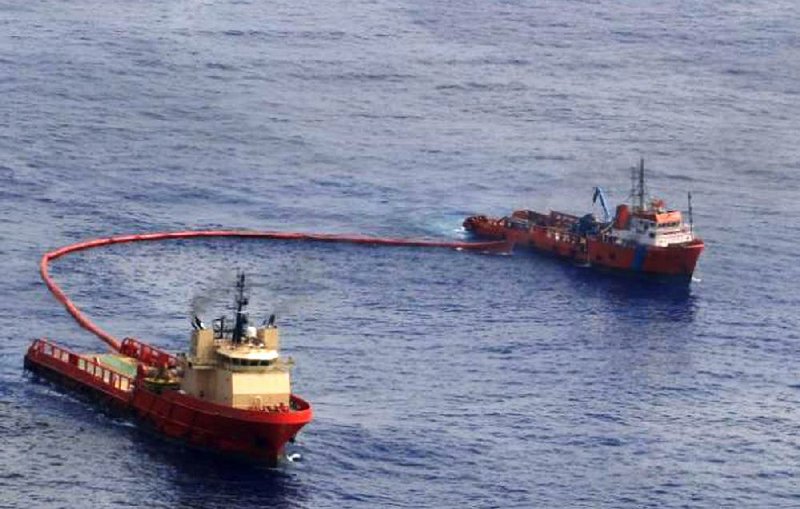LITTLE ROCK — Chevron Corp., Transocean Ltd. and 17 of the companies’ executives were formerly accused Wednesday by Brazilian federal prosecutors of environmental crimes related to an oil leak off Rio de Janeiro’s coast.
At least 110,000 gallons of oil seeped through cracks on the ocean floor near a Chevron Corp. appraisal well off the Rio de Janeiro coast in November. The well drilled by Transocean Ltd. has since been sealed, but a small amount of seepage reappeared in recent days, raising concern the damage is not yet over.
The charges were putbefore courts Wednesday. A judge will then decide if the executives will face trial, which would be a lengthy process given the number of defendants, the complexity of the case and the Brazilian legal system’s room for numerous appeals.
Prosecutors are asking each company to pay $5.5 million and demanding about $549,000 from each executive for damage to the environment.
George Buck, head of Chevron in Brazil, may be sentenced to jail for as many as 31 years, the prosecutor’s office said in a statement.
Those named by prosecutors in preliminary documents include six Americans, five Brazilians, two French and Australian nationals, one British citizen and one Canadian. They include the heads of the Brazilian subsidiaries of both Chevron and Transocean.
A judge ruled late last week that none of the executives could leave Brazil.
Brazil has seen much worse oil spills, but the Chevron leak is the biggest test of offshore drilling safety since huge deposits were discovered in recent years, reserves that could hold 50 billion barrels of oil.
Brazilian officials are counting on their country being one of the globe’s top oil-producing nations before the decade isout and politicians are debating how to divide the future royalties.
But Eric Smith, an offshore oil expert at Tulane University in New Orleans, said legal charges could spook other big foreign companies, risking delays in developing those finds.
“If you start locking up executives, people back in other oil companies like Shell, BP, ENI and anyone else with a concession in Brazil will notice and become wary,” Smith said.
With such a big potential payoff, “foreign oil companies won’t abandon Brazil completely, but they could retract, withdraw their assets and wait for better times, like they’re doing in Venezuela,” he added.
Gustavo Gattass, a Rio de Janeiro-based analyst at Brazilian investment bank BTG Pactual, disagreed.
“This strong stance by Brazilian prosecutors might rattle small companies, they may become more reluctant. But the exploration of oil is for big businesses, especially in Brazil’s offshore areas,” he said. “I don’t see any evidence to support the idea this will diminish investment.”
At the time of the leak, Chevron said it had underestimated the pressure in an underwater reservoir, so thatcrude rushed up a bore hole and eventually escaped into the surrounding seabed some 230 miles off Rio’s coast.
The oil escaped through at least seven narrow fissures on the ocean floor, all within 160 feet of the well head.
Last week, Chevron confirmed a “small new oil seepage” in the Frade field. The size of the new leak isn’t known, and Brazil’s National Petroleum Agency said it was detected because an oil slick appeared on the ocean surface.
Prosecutor Eduardo Santos de Oliveira said in his preliminary legal papers that the two companies failed to adopt procedures to contain the leak. He wrote that those expected to face charges didn’t halt drilling operations soon enough and that when questioned they said the risksinvolved “were acceptable.”
Oliveira says Chevron and Transocean “altered the truth” in documents presented to authorities, such as the number of ships deployed to contain the leak.
“The reckless operation that led to the environmental damage was planned or approved by all [the 17],” Oliveira said. “They knew they were drilling in a highpressure area and that the walls of the well could not withstand that pressure.”
Chevron has denied any wrongdoing but has said any legal decision would be abided by the company and its employees.
Information for this article was contributed by Bradley Brooks of The Associated Press and by Carlos Caminada of Bloomberg News.
Business, Pages 21 on 03/22/2012
